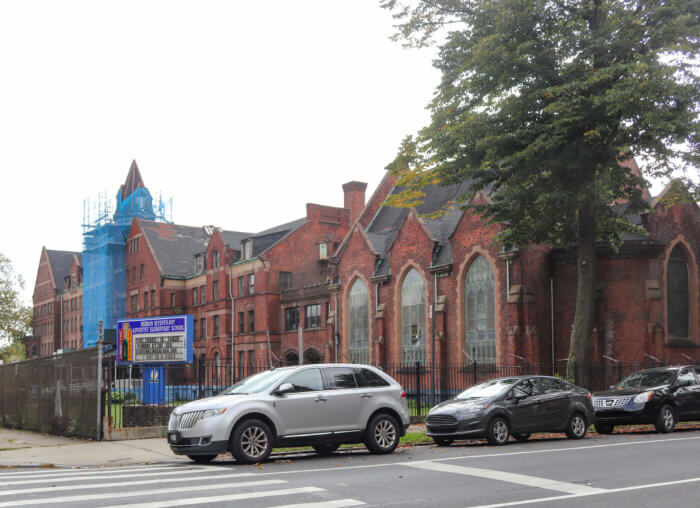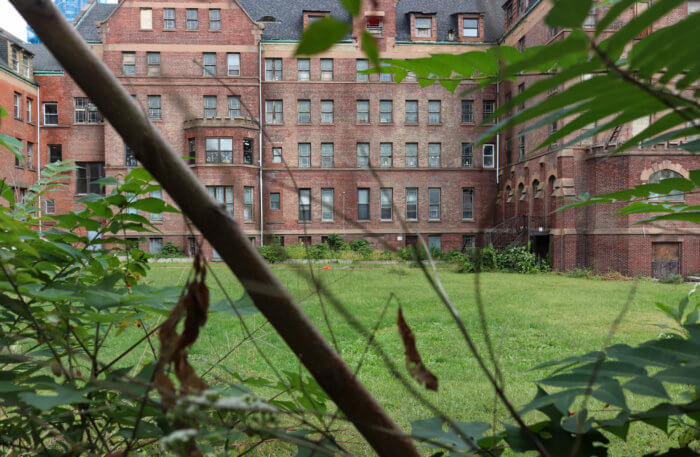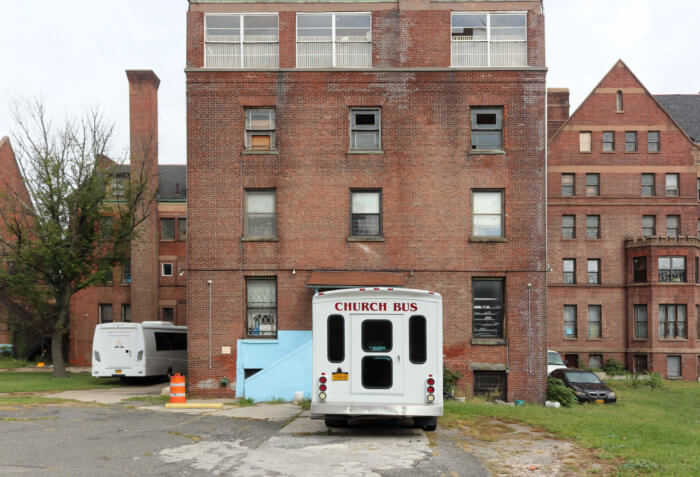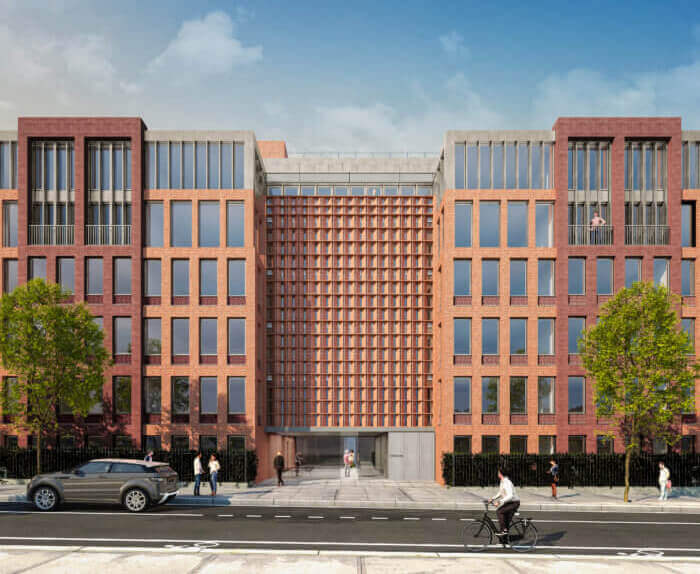The congregation of a Crown Heights church has joined residents and local advocates in their shared opposition to plans for large-scale residential development on the landmarked site of the church-owned Hebron Seventh Day Adventist School.
They are speaking out ahead of an appearance in front of the land use committee of Brooklyn Community Board 8 on Thursday, Oct. 1. In conversations, they say they are fed up with the lack of transparency from both the owner of the property and the developer.
“We see that this project is not going to help us,” said Mirlande Demero, a local resident and member of Hebron Seventh Day Adventist Church for over 30 years. She has been circulating a petition opposing the project among other members that now has more than 100 signatures, she said.
“People around the neighborhood, how much do they make? Do you think they can afford a studio every month for $2,500? It’s not built for the people in the neighborhood,” Demero added.
Located at 914-920 Park Pl., the building was constructed in 1889 as the Brooklyn Methodist Episcopal Home for the Aged and Infirm. Today, it is home to the Hebron Seventh Day Adventist School, and it was landmarked, along with the rest of the grounds, as part of the second phase of the Crown Heights North Historic District in 2011.

The Northeast Conference Corporation of Seventh Day Adventists, which owns the property, amended a sale agreement with 959 Sterling Partners LLC, a subsidiary of Hope Street Capital, in November 2019. According to a design presentation given to local community groups, the developer plans to demolish a mid 20th century addition at the back of the structure and construct a new building that will replace the addition and the open space around it, consuming the entire back end of the property along Sterling Place.
Those plans also indicate that the developer will provide restoration work to the facade of the school, at the front of the property, as part of the agreement. The church also plans to use funds from the deal to maintain its house of worship.
Plans have been filed with the Department of Buildings, but not approved, for a seven-story residential building with 201 apartments, parking underground for 142 cars and a pool in the cellar. Morris Adjmi Architects is the applicant of record on building permits.
During a presentation with local groups earlier this summer, developer Hope Street Capital told attendees that 30 percent of the planned units would be classified as affordable under the Affordable New York program, also known as the 421a tax break. Local advocates, including Friends of 920 Park, take issue with that, saying that under the program the developer has the opportunity to have those units be set at 130 percent of Area Median Income, which stretches the idea of affordability.
Additionally, many in the neighborhood feel saddened by the reluctance of their local Council member Robert E. Cornegy Jr. to speak out publicly against the project, according to Friends of 920 Park. Meanwhile, a petition opposing the proposed development from local advocates addressed to Cornegy has surged past 5,300 signatures.

“Council Member Cornegy and his team are actively engaged with the community board, community groups, and the developer about their perspectives on the proposed 920 Park Place development,” a spokesperson for Cornegy said in an email to Brooklyn Paper’s sister publication Brownstoner. “CM Cornegy requested from the developer their plans for the site and any renderings they could share in order to be sure both he and the community have access to the most up-to-date information about what the developer intends.”
The rep added: “CM Cornegy also requested the opening of a constructive dialogue between the community groups and the developer — with the goal of gaining further insight as to how the developer responds to the concerns the community has raised. Unfortunately, that initial constructive dialogue meeting, to include the developer, community stakeholders, and the council member, has not taken place yet. Also, the developer has not provided the additional details CM Cornegy requested that would help build our collective understanding on the current plans for the project.”
Attempts to reach the developer, Hope Street Capital, went unanswered before publication.
For the project to ultimately see the light of day, it must be first approved by the Landmarks Presentation Commission. But opponents of the project feel that the presence of Commissioner Everardo Jefferson, a principal architect at Caples Jefferson Architects PC, one of the firms listed on the Hebron proposal, presents a clear conflict of interest and could affect the ultimate fate of the property, they told Brownstoner.
An LPC spokesperson said the group has clear rules in place to handle such situations. “The Conflicts of Interest Board (COIB) routinely allows the firm of a Commissioner to continue to present projects to the Landmarks Commission by issuing waivers that permit this activity provided the commissioner recuses him/herself from the project before, during and after the public hearing, in addition to other requirements,” the spokesperson emailed Brownstoner. “This is what occurred in this matter; the COIB has reviewed the issue and stipulated that Commissioner Jefferson’s firm can continue to present, provided COIB-mandated restrictions apply, including Commissioner Jefferson recusing himself. COIB’s process is critical to allowing architects and other preservation professionals to be able to volunteer as LPC Commissioners.”
Members of the congregation are just the latest group to oppose the project: In addition to Friends of 920 Park, both the Crown Heights Tenants Union and the Crown Heights North Association have released statements against the project. They say they object to the removal of green space, the blocking of views of the back of the historic structure, the siting of the new construction in a landmark district and its proximity to the landmarked building.

The church has other, more attractive options to fund the repair and maintenance of its two buildings, according to the Crown Heights North Association. After helping to landmark the area, the community group met with the church several times about applying for grants, available to restore landmarked structures. Another option is to convert a portion of the existing building into apartments, leaving space for the school, rather than build a new structure.
“The opposition is surprising to me,” wrote Dr. Daniel Honore, President of the Northeastern Conference of the Seventh-day Adventists, in a statement. “Until very recently, our Hebron Seventh-day Adventist Bilingual School did not receive any attention at all from the folks who now seem concerned about the state of our church and school, a landmark that was originally the Methodist Home for the Aging. To add insult to injury, they are also now claiming their campaign to block our project is in order to ‘protect’ the buildings we are trying to save, which have been deteriorating in front of them for years. We find this duplicitous and deceptive.”
A growing number of local residents disagree, and as the process begins they are more eager than ever to voice their opinion.
This story first appeared on Brownstoner.com.






















